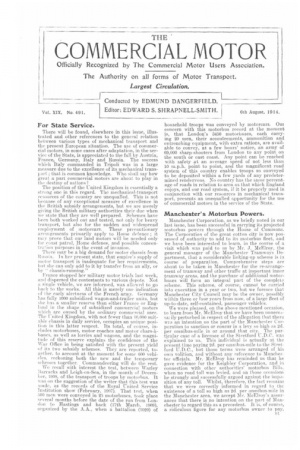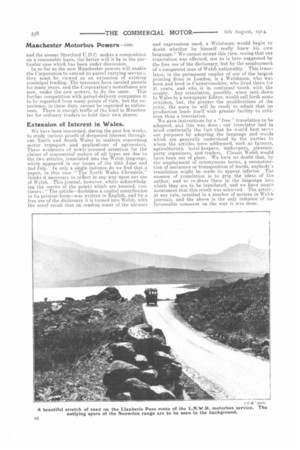Conducted by EDMUND DANGERFIELD,
Page 1

Page 2

If you've noticed an error in this article please click here to report it so we can fix it.
Vol. XIX. No. 491. Editor: EDWARD S. SHRAPNELL-SMITH.
For State Service.
There will be found, elsewhere in this issue, illustrated and other references to the general relation 'between various types of mechanical transport and the present European situation. The use of commercial motors, in some cases after adaptation, in the service of the State, is appreciated to the full by Austria, France, Germany, Italy and Russia. The success which Italy commanded in Tripoli was in a large measure due to the excellence of its mechanical transport ; that is common knowledge. Who shall say how great a part commercial motors are about to play in the destiny of nations?
The position of the United Kingdom is essentially a strong one in this regard. The mechanical-transport resources of the country are unequalled. This is not beeause of any exceptional measure of excellence in the British subsidy arrangements, but we are merely giving the British military authorities their due when we state that they are well prepared. Schemes have been both worked out and tested, not only for heavy transport., but also for the sudden and widespread employment ofmotorcars. These precautionary arrangements primarily apply to Home defence ; it may prove that our land motors will be needed only for coast patrol. Home defence, and possible concentra ion purposes in the event of invasion.
There may be a big demand for motor chassis from llessia. in her present state, that empire's supply of motor transport, is inadequate for her requirements, bat she can only add to it by transfer from an ally, or by '' chassis-running."
France stopped her military motor trials last week, and dispersed the contestants to various depots. Not a single vehicle, we are informed, was allowed to go hack to the works. All this is merely one indication of I he early alertness of the French army. Germany has fully 1000 subsidized wagon-and-trailer units, hat she has a smaller reserve than either France or England in the shape of subsidized commercial motors which are owned by the ordinary commercial user. The United Kingdom, with not fewer than 10,000 suitable chassis in daily service, occupies an unique position in this latter respect. Its total, of course, ineludes motorbuses, motor coaches and motor chars-ha banes, as well as lorries and wagons, and the magnittide of this reserve explains the confidence of the War Office in being satisfied with the present yield of its two subsidy schemes. They are reported, together, to account at the moment for some 600 vehicles, reckoning both the new and the temporary schemes together. Commandeering will do the rest. Wre recall with interest the test, between Warley liarracks and Leigh-on-Sea, in the month of December, 1908, of the transport of troops by motorbus. It was on the suggestion of the writer that this test was made, as the records of the Royal United Service Institution show (February, 1907). That test, when a00 men were conveyed in 2 motorbuses, took place several months before the date of the run from London to Hastings and back (4 7th March, /909), organized by the A.A., when a battalion (1020) of
household troops was conveyed by motorcars. Our concern with this motorbus record at the moment is, that London's 3450 motorbuses, each carrying 20 men, their accoutrements, ammunition and entrenching equipment, with extra rations, are available to convey, at a few hours' notice, an army of 69,000 sharp-shooters from London to any point on the south or east coast. Any point can be reached with safety at an average speed of not less than 10 m.p.h. point to point, and the magnificent road system of this country enables troops so conveyed to be deposited within a few yards of any predetermined rendezvous. No country has the same percentage of roads in relation to area as that which England enjoys, and our road system, if it be properly used in conjunction with our resources in mechanical transport, presents an unequalled eipportunity for the use of commercial motors in the service of the State.
Manchester's Motorbus Powers.
Manchester Corporation, as we briefly noted in our last issue, has been successful in carrying its projected motorbus powers through the House of Commons. The Corporation of the great cotton city is -now possessed of authority to add to its motorbus fleet, and we have been interested to learn, in the course of a visit which was paid to its by Mr. J. McElroy, the general manager of the Manchester Tramways Department, that a considerable linking-up scheme is in course -of preparation. Comprehensive steps are about to be taken in Manchester for the re--arrangement of tramway and other traffic at important inner tramway areas, and the purchase of additional motorbuses will form an integral part of the complete scheme. This scheme, of course, cannot be carried into execution in a year or two, but we foresee that Manchester City Council may be the owner, possibly within three or four years from now, of a large fleet of up-to-date, self-contained, passenger vehicles. We. were pleased. on the above mentioned occasion, to learn from Mr. McElroy that. we have been unneceze sarily perturbed in respect of the allegation that there was an intention on the part of the Manchester Corporation to sanction or concur in a levy so high as 2d. per omnibus-mile in or around that city. The particular case of a licensee of the Stretford 1.7.D.C. was explained to us. This individual is actually at the present time paying 2d. per omnibus-mile to the Stretford TT.D.C., but those terms were arranged of his own volition, and without any reference to Manchester officials. Mr. McElroy -has reminded us that he gave evidence for the Keighley Corporation, and in connection with other authorities' motorbus Bills, when no road toll was levied, and on those occasions he strongly and successfully argued against the imposition of any toll. Whilst, therefore, the fact -remains that we were correctly informed in regard to the existence of a toll so high as 2d. per omnibus-mile in the Manchester area, we accept Mr. MeEIroy's assurances that there is no-intention on the part of Manchester to regard this as aprecedent. It is, of course, a ridiculous figure for any motorbus owner to pay,
and the sooner Stretford U.D.C. makes a composition on a reasonable basis, the better will it be in the particular case which has been under discussion.
In so far as the new Manchester powers will enable the Corporation to extend its parcel-carrying services, they must be viewed as an extension of existing municipal trading. The tramcars have carried parcels for many years, and the Corporation's motorbuses are now, under the new powers, to do the same. This further competition with parcel-delivery companies le to he regretted from many points of view, but the eG.perience. in these days, cannot be regarded as unforeseen. There is enough traffic of the kind in Manchester for ordinary traders to hold their own shares.
Extension of Interest in Wales.
We have been interested, during the past. few weeks, to study various proofs of deepened interest throughout North and South Wales in matters concerning motor transport and applications of agrimotors. These e.ridences of newly-aroused attention for the claims of commercial motors of all types are due to the two articles, translated into the Welsh language, which appeared in our issues of the 25th June and 2nd July. In only a single instance do we find that a paper, in this case "The North Wales Chronicle," thinks it necessary to reflect in any way upon our use of Welsh. This journal, however, whilst acknowledging the merits of the points which are treated, continues: " The article—doubtless a capital contribution in its pristine form—was written in English, and by a free use of the dictionary it is turned into Welsh, with the usnal result that on reading many of the phrases
and expressions used, a Welshman would begin to doubt whether he himself really •knew his own language." We cannot accept this view, seeing that our translation was effected, not as is here suggested by the free use of the dictionary, but by the employmeet of a competent man of Welsh nationality. This translator, in the permanent employ of one of the largest printing firms in London, is a Welshman, who was born and bred in Carnarvonshire, who lived there for 21 years, and who is in continual touch with the county. Any translation, possibly, when sent down to Wales to a newspaper Editor, would call forth some criticism, but, the greater the qualifications of the critic, the more he will be ready to admit that no production lends itself with greater facility to criticism than a translation.
We gave instructions for a " free " translation to be adopted, and this was done ; our translator had in mind continually the fact that he would best serva our purposes by adopting the language and words which are generally understood by the parties to whom the articles were addressed, such as farmers, agriculturists, hotel-keepers, innkeepers, pleasureparty organizers, and traders. Classic Welsh would have been out of place. We have no doubt that, by the employment of synonymous terms, a reconstruetion of sentences or transposition of words, anybody's translation might be made to appear Inferior. Th6 essence of translation is to grip the ideas of the author, and to re-dress them in the language into which they are to be translated, and we have ample assurances that this result was achieved. The articha, at. any rate, resulted in a number of notices in Welsh journals, and the above is the only instance of unfavourable comment on the way it was done.
























